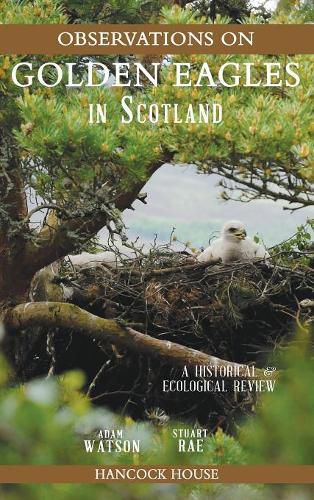Readings Newsletter
Become a Readings Member to make your shopping experience even easier.
Sign in or sign up for free!
You’re not far away from qualifying for FREE standard shipping within Australia
You’ve qualified for FREE standard shipping within Australia
The cart is loading…






This title is printed to order. This book may have been self-published. If so, we cannot guarantee the quality of the content. In the main most books will have gone through the editing process however some may not. We therefore suggest that you be aware of this before ordering this book. If in doubt check either the author or publisher’s details as we are unable to accept any returns unless they are faulty. Please contact us if you have any questions.
The golden eagle is widely considered one of the worlds most magnificent birds. It is the epitome of wild places. The bird has a huge world distribution, and each pair of eagles has a large home range. They shy away from man so those who study them spend most of their time watching for, but not seeing the elusive bird. These difficulties and a love of the eagles hill country in Scotland inspired the authors. In Scotland, the golden eagle mostly lives on the hill ground of the Highlands where some of the mainland uses over the past two hundred years have been sheep grazing, deer-stalking and grouse shooting. Here the authors describe eagle numbers, nesting behaviour and breeding success in two study areas; in north-east and north-west Scotland. They use data from long-term studies, supported with research into historical documents. The result is a deep understanding of how eagles are faring, and how they have been or might be affected by human land use. Adam Watson and Stuart Rae have studied golden eagles for more than seventy and forty years, and have spent thousands of days in eagle country. Their professional research and personal studies have been on various ecological topics that pertain to the hills, and both have also climbed, skied and generally explored in much of the Highlands, always making observations on aspects of the hills and their wildlife. They are founder members of the North East Scotland Raptor Study Group, and they have studied other raptors besides their main work on golden eagles. They use an objective approach to golden eagles, as with their other subjects, relying on: field notes, reading the land, and interpreting how they fit in the Highlands.
$9.00 standard shipping within Australia
FREE standard shipping within Australia for orders over $100.00
Express & International shipping calculated at checkout
This title is printed to order. This book may have been self-published. If so, we cannot guarantee the quality of the content. In the main most books will have gone through the editing process however some may not. We therefore suggest that you be aware of this before ordering this book. If in doubt check either the author or publisher’s details as we are unable to accept any returns unless they are faulty. Please contact us if you have any questions.
The golden eagle is widely considered one of the worlds most magnificent birds. It is the epitome of wild places. The bird has a huge world distribution, and each pair of eagles has a large home range. They shy away from man so those who study them spend most of their time watching for, but not seeing the elusive bird. These difficulties and a love of the eagles hill country in Scotland inspired the authors. In Scotland, the golden eagle mostly lives on the hill ground of the Highlands where some of the mainland uses over the past two hundred years have been sheep grazing, deer-stalking and grouse shooting. Here the authors describe eagle numbers, nesting behaviour and breeding success in two study areas; in north-east and north-west Scotland. They use data from long-term studies, supported with research into historical documents. The result is a deep understanding of how eagles are faring, and how they have been or might be affected by human land use. Adam Watson and Stuart Rae have studied golden eagles for more than seventy and forty years, and have spent thousands of days in eagle country. Their professional research and personal studies have been on various ecological topics that pertain to the hills, and both have also climbed, skied and generally explored in much of the Highlands, always making observations on aspects of the hills and their wildlife. They are founder members of the North East Scotland Raptor Study Group, and they have studied other raptors besides their main work on golden eagles. They use an objective approach to golden eagles, as with their other subjects, relying on: field notes, reading the land, and interpreting how they fit in the Highlands.